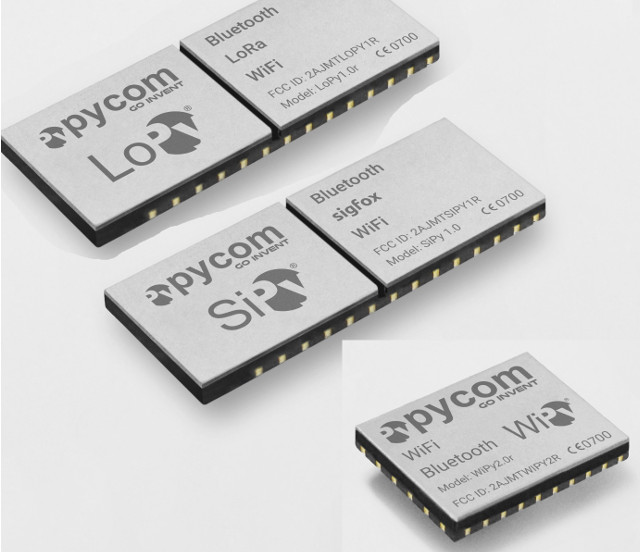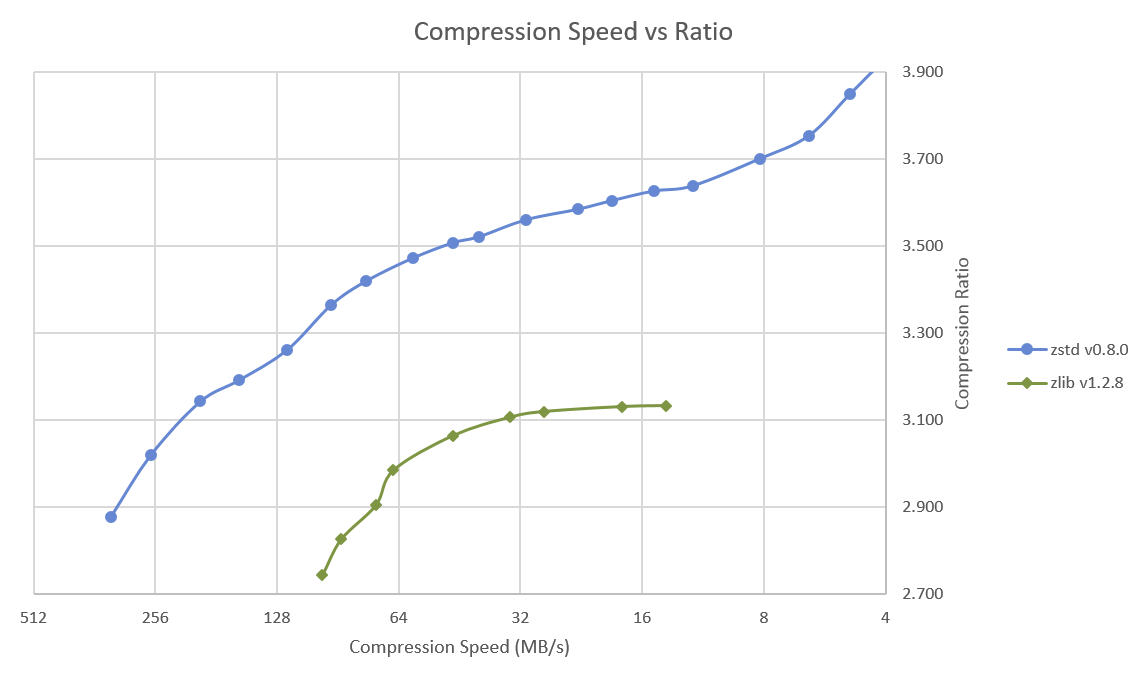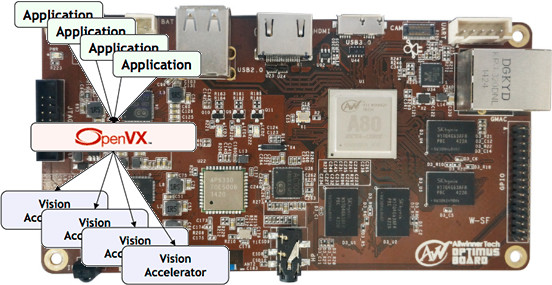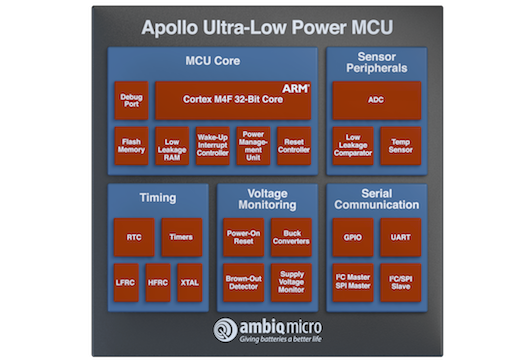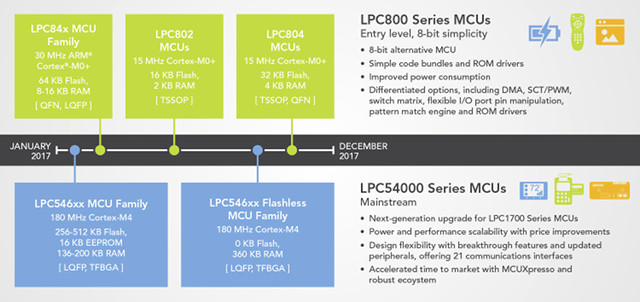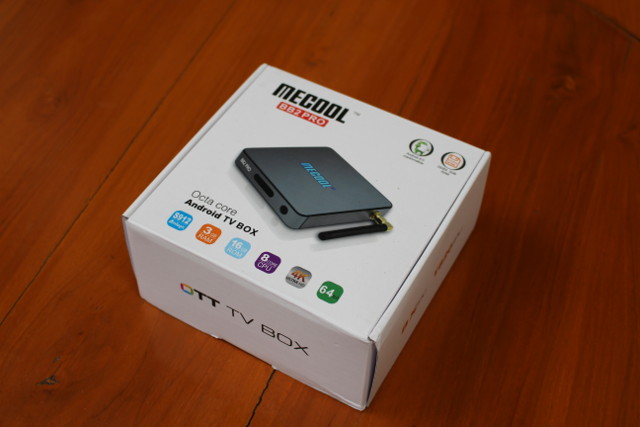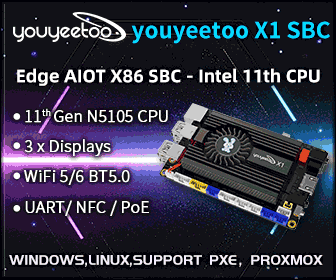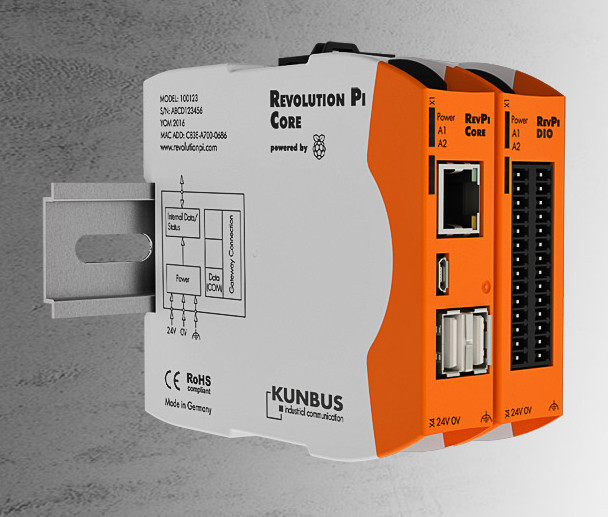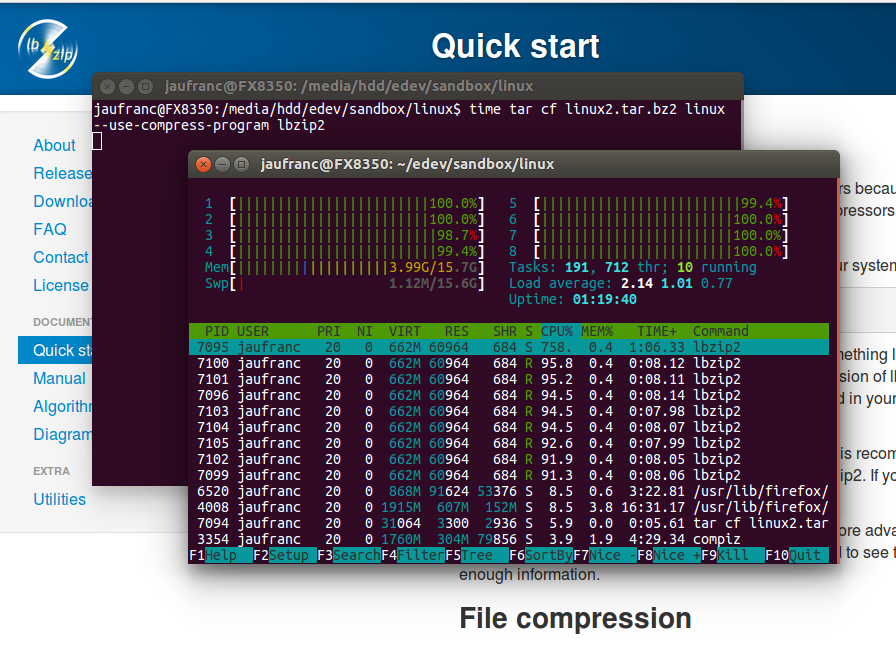Pycom is the company making some relatively popular IoT boards programmable with Python such as WiPy, LoPy, SiPy, and soon FiPy, supporting respectively WiFi+BLE, LoRa+WiFi+BLE, Sigfox+WiFi+BLE, and for the latter all four plus LTE CAT M1/NB1. Those little boards are great for personal projects and/or to experiment, but for those of you who would like to integrated IoT connectivity into your own hardware projects, Pycom will soon launch three OEM module for corresponding to WiPy, SiPy and LoPy connectivity featues with respectively W01, S01 and L01 modules. Key features: W01 WipY 2.0 OEM Module – Dual network BLE and WiFi – 7.95 Euros L01 LoPy OEM module – LoRa, WiFi and Bluetooth – 14.95 Euros S01 SiPy OEM module – Sigfox, WiFi and Bluetooth; Available in both 14dB (for Europe) and 22dB (outside Europe) version for respectively 14.95 and 19.95 Euros All three models have basically the same functionality as […]
Facebook Zstandard “zstd” & “pzstd” Data Compression Tools Deliver High Performance & Efficiency
Ubuntu 16.04 and – I assume – other recent operating systems are still using single-thread version of file & data compression utilities such as bzip2 or gzip by default, but I’ve recently learned that compatible multi-threaded compression tools such as lbzip2, pigz or pixz have been around for a while, and you can replace the default tools by them for much faster compression and decompression on multi-core systems. This post led to further discussion about Facebook’s Zstandard 1.0 promising both smaller and faster data compression speed. The implementation is open source, released under a BSD license, and offers both zstd single threaded tool, and pzstd multi-threaded tool. So we all started to do own little tests and were impressed by the results. Some concerns were raised about patents, and development is still work-in-progess with a few bugs here and there including pzstd segfaulting on ARM. Zlib has 9 levels of […]
Imagination PowerVR G6230 is the First GPU To Pass Khronos OpenVX 1.1 Conformance
The Khronos Group is the non-profit consortium group behind open standards and APIs for graphics, media and parallel computation such as OpenGL for 3D graphics, OpenCL for GPGPU, OpenVG for 2D vector graphics, etc… OpenVX is one of their most recent open, royalty-free standard, and targets power optimized acceleration of computer vision applications such as face, body and gesture tracking, smart video surveillance, advanced driver assistance systems (ADAS), object and scene reconstruction, augmented reality, visual inspection, robotics and more. The first revision of the standard was released in 2014, and the latest OpenVX 1.1 revision was just released in May 2016. We’ve already seen OpenVX 1.1 support in Nvidia Jetson TX1 module & board, but Khronos has a conformance program to test implementations, and if successful, allow companies to use the logo and name of the API. The version first GPU to pass OpenVX 1.1 conformance is Imagination Technologies PowerVR […]
Ambiq Micro Introduces Ultra-Low Power Apollo 2 Cortex-M4F MCU Consuming Less than 10 μA/MHz
Last year Ambiq Micro unveiled their Apollo Cortex-M4F MCU with Cortex M0+ energy efficiency thanks to operation in sub-threshold voltage (< 0.5 V), and the MCU is said found in Matrix Powerwatch, a fitness tracker powered by body heat that you never need to charge. The company has recently announced a new version of the micro-controller with Apollo 2 MCU with better maximum performance thanks to a higher maximum clock speed (48 MHz vs 24 MHz), and higher efficiency (10 μA/MHz vs 30 μA/MHz @ 3.3V). Apollo 2 MCU key features and specifications: Ultra-low supply current <10 μA/MHz executing from flash at 3.3 V <10 μA/MHz executing from RAM at 3.3 V ARM Cortex-M4 Processor up to 48 MHz with FPU, MMU, wake-up interrupt controller with 32 interrupts Ultra-low power memory Up to 1 MB of flash memory for code/data Up to 256 KB of low leakage RAM for code/data […]
NXP LPC Microcontrollers Roadmap for 2017 – LPC800 and LPC54000 Series
With the acquisition of Freescale, NXP now has both Kinetis and LPC ARM Cortex M micro-controller families. The company has kept selling both so far, but it’s unclear whether they’ll keep developing new Kinetis MCU family in the future. There’s no such doubt about LPC family with the company having published a 2017 roadmap for ARM Cortex M0+ based LPC 800 series, and ARM Cortex M4 based LPC54000 series. LPC800 series MCUs are promoted as 8-bit MCU alternatives, and three new models are expected next year: LPC84x ARM Cortex M0+ @ 30 MHz with 64KB flash, 8 to 16KB RAM available in QFN and LQFP packages. LPC802 ARM Cortex M0+ @ 15 MHz with 16KB flash, 2KB RAM available in TSSOP packages LPC804 ARM Cortex M0+ @ 15 MHz with 32KB flash, 4KB RAM available in QFN or TSSOP packages There will be new models of the more powerful LPC54000 […]
Review of Mecool BB2 Pro TV Box with DDR4 Memory – Part 1: Specs, Unboxing and Teardown
Mecool BB2 Pro is yet another Amlogic S912 Android 6.0 TV box, but after Eweat R9 Plus, it’s my second TV box with DDR4 memory that should deliver much higher bandwidth compared to DDR3 memory used in most TV boxes. But so far, it’s clear how much performance can be extracted from the system with higher memory bandwidth in actual use, and that’s exactly what I hope to find out in the second part of the review, but in this post I start by going through the specs, check the box and its accessories, as well as the hardware design. Mecool BB2 Pro specifications Apart from the DDR4 memory, BB2 Pro has pretty common specifications: SoC – Amlogic S912 octo-core ARM Cortex A53 processor @ up to 1.5 GHz with ARM Mali-820MP3 GPU System Memory – 3 GB DDR4 Storage – 16 GB eMMC flash + micro SD slot up […]
Kunbus RevolutionPi RevPi Core Raspberry Pi based Industrial Computer Sells with Digital I/O Modules and Fieldbus Gateways
Kunbus, a German company specialized in industrial network solution, has decided to design an industrial system based on Raspberry Pi Computer module supporting variable power supply, a wide temperature range, DIN rail mounting, etc, as well as corresponding digital I/O modules and fieldbus gateways. RevolutionPI RevPi Core specifications: SoC – Broadcom BCM2835 ARM11 processor @ 700 MHz System Memory – 512 MB Storage – 4GB flash Video Output – Micro HDMI port Connectivity – 10/100M Ethernet port USB – 2x USB 2.0 host ports, 1x micro USB port Misc – RTC, 3x status LEDs (2 programmable) Power Supply – 10.7 V to 28.8 V; polarity protection; 4 kV / 8 kV ESD protection & EMI passed (according to EN61131-2 and IEC 61000-6-2), surge and burst tests passed Power Consumption – Max: 10 Watts including 2 x 450 mA USB load; typ.: 4 watts. Dimensions – 96 x 22.5 x 110.5 […]
Compress & Decompress Files Faster with lbzip2 multi-threaded version of bzip2
Bzip2 is still one of the most commonly used compression tools in Linux, but it only works with a single thread, and I’ve been made aware that lbzip2 allows multi-threaded bzip2 compressions which should lead to much better performance on multi-core systems. lbzip2 was not installed by default in my Ubuntu 16.04 machine, but it’s easy enough to install:
|
1 |
sudo apt install lbzip2 |
I have cloned mainline linux repository on my machine, so let’s see how long it takes to compress the directory with bzip2 (one core compression):
|
1 2 3 4 5 |
time tar cjf linux.tar.bz2 linux real 9m22.131s user 7m42.712s sys 0m19.280s |
9 minutes and 22 seconds. Now let’s repeat the test with lbzip2 using all 8 cores from my AMD FX8350 processor:
|
1 2 3 4 5 |
time tar cf linux2.tar.bz2 linux --use-compress-program=lbzip2 real 2m32.660s user 7m4.072s sys 0m17.824s |
2 minutes 32 seconds. Almost 4x times, not bad at all. It’s not 8 times faster because you have to take into account I/Os, and at the beginning the system is scanning the drive, using all 8-core but not all full throttle. […]


